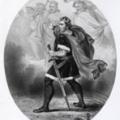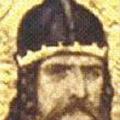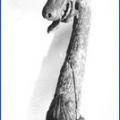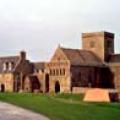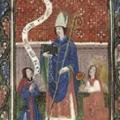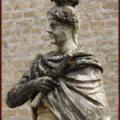Posted on February 6, 2013 by Donald
When Duncan I took the Scottish throne, his grandfather had the blood of several relatives on his hands, having murdered the way clear for Duncan.
With such ill feeling as there must have been, Duncan would have been wise to pacify his remaining family, especially his senior cousin Thorfinn the Mig...
Posted on February 6, 2013 by Donald
With Malcolm II as king and Owen of Strathclyde supporting him, an important battle was fought against Earl Uhtred of Bamburgh and his Northumbrian army at Carham, near Roxburgh. The Battle of Carham (sometimes referred to as the Battle of Coldstream) is generally believed to have been fought in 101...
Posted on February 6, 2013 by Donald
The Danes, already well-established through the Hebrides and on the mainland and supported with on-going North Sea crossings, battled with Alba’s Picts in 839 and utterly defeated them.
The North of Scotland experienced a gradual population migration, under the Norse pressure, with the Scots of the...
Posted on February 6, 2013 by Donald
The Viking invasions of Scotland heralded a new type of warfare.
By equipping their boats with keels, a significant number of warriors could be accommodated on sea journeys that presented little problem to the highly developed Norse navigational and rigging skills.
Their terror is first recorded i...
Posted on February 6, 2013 by Donald
Despite his name meaning ‘dove’, Columba was banished from Ireland in 563, aged forty two, for leading battles against greedy Irish monasteries. With twelve supporters he sailed in a curragh to Iona, the island lying a kilometre south-west of the end of Mull.
He crowned his fellow Irishman Aidan Ki...
Posted on February 6, 2013 by Donald
When Bede’s Historia Ecclesiastica was written in 731, it named Ninian as the first Scottish Christian. The Romans left Britain with traces of their Christianity remaining.
Ninian, the son of a Scottish chief, was trained as a bishop by the Romans before founding a church at Whithorn in Galloway wh...
Posted on February 6, 2013 by Donald
The Battle of Mons Graupius took place in 83 or 84. Julius Agricola, the Roman governor had sent his fleet ahead to panic the Caledonians, and, with light infantry reinforced with British auxiliaries, reached the site, which he found occupied by the enemy.
Even though the Romans were outnumbered in...
Posted on February 6, 2013 by Donald
Julius Agricola was sent in the year AD77 to be governor of Britain for the Roman Empire. He pushed the Empire's reach northwards with advances to the valley crossing Scotland from the Clyde to the Forth in AD80. He enforced the front with a row of forts before continuing with campaigns up the east ...

